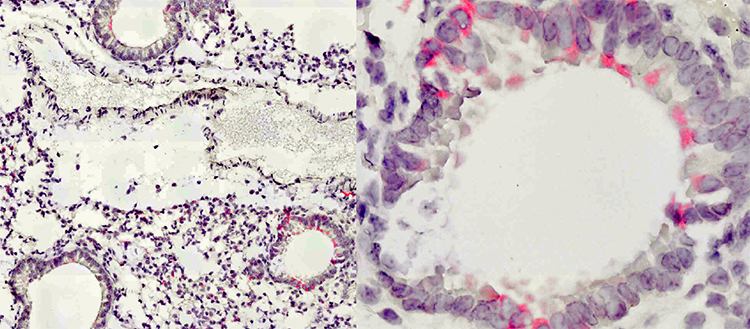Lung bacteria defend against pneumonia
Commensal bacteria confer a prominent protective role against invading bacterial in mucosal surfaces, the major entry port for microbial pathogens. A research team of UNIGE shows that probiotics could be an alternative to antibiotics for treating respiratory illnesses.

Microscopy image of lung sections of mice. Commensal bacteria are stained in red-pink colours and lung cells are coloured in purple/gray. © UNIGE/Schmolke
In healthy organisms, commensal bacteria, which live inside the host without harming it, provide a competitive barrier against invading bacterial pathogens. A research team of the University of Genva (UNIGE), studied the role of lung microbiota against Pneumococcus colonisation, an important human pathogen responsible for many co-infections associated with flu. UNIGE’s researchers had previously reported that a significant amount of Lactobacillus bacteria, which are known to act as antimicrobials and immune system modulators, exist in the lung microbiota of healthy mice. In the current study, published in eLife, they identified these commensal bacteria as Lactobacillus murinus (L. murinus), with further gene sequencing and microscopy showing that the bacteria are tightly associated with mouse lung tissue. Treating mice with L. murinus, following influenza A -the flu virus -infection, provided a barrier against pneumococcal colonisation in the animals. These results suggest that resident commensals in the lung could be applied as probiotics to counteract lung colonisation by pathogenic bacteria.
Commensal microflora, also called indigenous microbiota, is a complex set of bacteria and protozoa, located under the superficial layer of the skin, and on a large part of the mucosal surface characterized by the presence of an overlying mucosal fuid such as, among others, nasal and brouchial mucus. This microbiota is present from birth and maintains a commensal relationship, e.g. a natural biological interaction between two living beings. Recent studies shows that the bacterial microbiota confers colonization resistance against bacterial pathogens. “It is already well known how commensal bacteria in the gut fight off pathogens,” explains co-first author Soner Yildiz, postdoctoral research fellow at the Department of Microbiology and Molecular Medicine of UNIGE Faculty of Medicine. “But how lung bacteria carry out this role is less clear.”
Lung microbiota under the scope
To address this gap, the UNIGE team studied the role of lung microbiota against Pneumococcus colonisation in mice. Pneumococcus is a species of bacteria of the genus Streptococcus, an important human pathogen. In particular, it is responsible for many co-infections: for example, it aggravate mortality during flu epidemia. The team had previously reported that a significant amount of Lactobacillus bacteria, which are known to act as antimicrobials and immune system modulators, exist in the lung microbiota of healthy mice. In the current study, they identified these commensal bacteria as Lactobacillus murinus (L. murinus), with further gene sequencing and microscopy showing that the bacteria are tightly associated with mouse lung tissue.
A broad-spectrum protection
The team next exposed cultures of L. murinus to pneumococcus. They found that L. murinus inhibited the growth of the pathogen through the release of lactic acid. “This antibacterial activity was not limited to pneumococcus,” says co-first author João Pereira Bonifacio Lopes, PhD student at the UNIGE. “It also affected S. aureaus, the pathogen that can cause bloodstream, bone and joint infections, as well as pneumonia.” By treating mice with L. murinus following influenza A infection, they found that the bacteria provided a barrier against pneumococcal colonisation in the animals.
“This suggests that resident commensals in the lung could be applied as probiotics to counteract lung colonisation by pathogenic bacteria,” concludes senior author Mirco Schmolke, Professor at the Department of Microbiology and Molecular Medicine of UNIGE Faculty of Medicine. “However, further studies are needed before this can be explored as a potential treatment in humans. If it one day proves to be effective, the approach could improve the clinical outcomes for patients who are susceptible to respiratory tract infections.”
9 Dec 2020